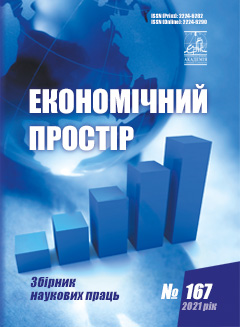ФОРМУВАННЯ СУЧАСНОГО ОСВІТНЬОГО ПРОСТОРУ УКРАЇНИ У КОНТЕКСТІ ЕКОНОМІКИ ЗНАНЬ
Анотація
Виконано контент-аналіз понять «освітній простір» і «освітнє середовище». Визначено, що поняття «простір» за своїм змістом є більш ширшим, аніж поняття «середовище». Розроблено модель освітнього простору в Україні, яка включає заклади освіти як товаровиробників освітніх послуг, які задіяні у функціонуванні трьох ринків: ринку освітніх послуг, для якого розробляють свої освітні програми; ринку праці, для якого ведуть підготовку висококваліфікованих кадрів (випускників); ринку науково-технічної продукції й послуг, на якому пропонують результати своєї науково-технічної діяльності. У запропонованій моделі освітнього простору виокремлено суб’єкти й об’єкти ринку освітніх послуг, ринку праці та ринку науково-технічної продукції і послуг. Досліджено сучасну міжнародну практику концепції освітніх послуг. Визначено складники формування сучасного освітнього простору в контексті економіки знань.
Посилання
Ахновська І.О. Теоретичні засади формування освітнього середовища в контексті економіки знань. Економiка i органiзацiя управлiння. 2018. № 4(32). С. 26–34.
Приходченко К.І. Творче освітньо-виховне середовище загальноосвітнього закладу гуманітарного профілю : монографія. Донецьк : ДонНУ, 2007. 640 с.
Рибка Н.М. Єдиний освітній простір як інтеграційна система: соціально-філософський аналіз : автореф. дис. … канд. філософ. наук : 09.00.03 «Соціальна філософія та філософія історії». Одеса, 2005. 24 с.
Семенова А.В. Теоретичні і методичні засади застосування парадигмального моделювання у процесі професійної підготовки майбутніх учителів : автореф. дис. … докт. пед. наук : 13.00.04 «Теорія і методика професійної освіти». Тернопіль, 2009. 42 с.
Леонова О. Образовательное пространство как педагогическая реальность. Alma mater (Вестник высшей школы). 2006. № 1. С. 36–40.
Цимбалару А.Д. Освітній простір: сутність, структура і механізми створення. Український педагогічний журнал. 2016. № 1. С. 41–50.
Кривых С.В. Соотношение понятий «среда» и «пространство» в социокультурном и образовательном аспектах. URL: http://portalus.
Казакова К.С. Образовательная среда: основные исследовательские подходы. Труды Кольского научного центра РАН. 2011. № 1. С. 65–71.
Освітнє середовище як концепт інноваційної діяльності закладу освіти (скорочений варіант) / Авторський колектив навчально-виховного комплексу «Школа-гімназія-ліцей» № 10 м. Бердичева. Освітній простір : портал громадських експертів «Освітня політика» від 10.02.2014. URL: http://education-ua.org/osvitniy-prostir.php.
Братко М.В. Структура освітнього середовища вищого навчального закладу. Наукові записки. Серія «Педагогічні науки». 2015. Вип. 135. С. 67–72.
Козырев В.А. Построение модели гуманитарной образовательной среды. Pedagog. 1999. № 7. URL: https://old.altspu.ru/Journal/pedagog/pedagog7/a06.html.
Лобач Н.В. Освітнє середовище як засіб формування інформаційно-аналітичної компетентності студентів. Наукові записки. Серія «Проблеми методики фізико-математичної і технологічної освіти». 2014. Вип. 5. С. 42–46.
Гора О.В. Освітнє середовище як фактор формування національної ідентичності студентів вищих навчальних закладів. Витоки педагогічної майстерності. 2011. Вип. 8(1). С. 97–101.
Онищенко В.О. Інноваційні підходи управління вищим навчальним закладом. Менеджмент у ХХІ сторіччі : матер. Міжнар. наук.-практ. конф., м. Полтава, 16–17 травня 2013 р. С. 506–509.
Майборода Т.М. Державне регулювання освіти в контексті розвитку національної економіки : дис. ... канд. екон. наук : 08.00.03. Полтава, 2019. 259 с.
Антохов А. Вплив ринку освітніх послуг на розвиток інноваційної економіки України. Українська наука: минуле, сучасне, майбутнє. 2012. Вип. 17. С. 14–22.
Akhnovsʹka I.O. (2018) Teoretychni zasady formuvannya osvitnʹoho seredovyshcha v konteksti ekonomiky znanʹ [Theoretical principles of formation of educational environment in the context of knowledge economy]. Ekonomika i orhanizatsiya upravlinnya, no. № 4 (32), pp. 26–34.
Prykhodchenko K.I. (2007) Tvorche osvitnʹo-vykhovne seredovyshche zahalʹnoosvitnʹoho zakladu humanitarnoho profilyu [Creative educational environment of a general educational institution of humanitarian profile]: Donetsʹk: DonNU (in Ukrainian).
Rybka N.M. (2005) Unified educational space as an integration system: socio-philosophical analysis [A single educational space as an integration system: socio-philosophical analysis] (PhD Thesis), Odesa.
Semenova A.V. (2009) Theoretical and methodical principles of application of paradigmatic modeling in the process of professional training of future teachers [Theoretical and methodical bases of application of paradigmatic modeling in the course of professional training of future teachers] (PhD Thesis), Ternopilʹ.
Leonova O. (2006) Obrazovatel'noye prostranstvo kak pedagogicheskaya real'nost' [Educational space as a pedagogical reality]. Alma mater (Vestnik vysshey shkoly). no. № 1, pp. 36–40.
Tsymbalaru A.D. (2016) Osvitniy prostir: sutnistʹ, struktura i mekhanizmy stvorennya. Ukrayinsʹkyy pedahohichnyy zhurnal [Educational space: essence, structure and mechanisms of creation]. Ukrayinsʹkyy pedahohichnyy zhurnal. no. № 1, pp. 41–50.
Krivykh S.V. Sootnosheniye ponyatiy ‘‘sreda’’ i ‘‘prostranstvo’’ v sotsiokul'turnom i obrazovatel'nom aspektakh [Correlation of the concepts of ‘‘environment’’ and ‘‘space’’ in the socio-cultural and educational aspects]. Available at: URL: http://portalus (accessed 24.01.2021).
Kazakova K.S. (2011) Obrazovatel'naya sreda: osnovnyye issledovatel'skiye podkhody [Educational environment: basic research approaches]. Trudy Kol'skogo nauchnogo tsentra RAN, vol. № 1, pp. 65–71.
Avtorsʹkyy kolektyv navchalʹno-vykhovnoho kompleksu «Shkola-himnaziya-litsey» № 10 m. Berdycheva (2014) Osvitnye seredovyshche yak kontsept innovatsiynoyi diyalʹnosti zakladu osvity (skorochenyy variant) [Educational environment as a concept of innovative activity of an educational institution (abbreviated version)]. Osvitniy prostir: portal hromadsʹkykh ekspertiv «Osvitnya polityka». Available at: http://education-ua.org/osvitniy-prostir.php (accessed 24.01.2021).
Bratko M.V. (2015) Struktura osvitnʹoho seredovyshcha vyshchoho navchalʹnoho zakladu [The structure of the educational environment of higher education. Proceedings]. Naukovi zapysky. Seriya: Pedahohichni nauky, vol. 135, pp. 67–72.
Kozyrev V.A. (1999) Postroyeniye modeli gumanitarnoy obrazovatel'noy sredy [Building a model of a humanitarian educational environment]. Pedagog,. no. 7. Available at: https://old.altspu.ru/Journal/pedagog/pedagog7/a06.Html (accessed 24.01.2021).
Lobach N.V. (2014) Osvitnye seredovyshche yak zasib formuvannya informatsiyno-analitychnoyi kompetentnosti studentiv [Educational environment as a means of forming information and analytical competence of students]. Naukovi zapysky. Seriya: Problemy metodyky fizyko-matematychnoyi i tekhnolohichnoyi osvity, vol. 5, pp. 42–46.
Hora O.V. (2011) Osvitnye seredovyshche yak faktor formuvannya natsionalʹnoyi identychnosti studentiv vyshchykh navchalʹnykh zakladiv [Educational environment as a factor in the formation of national identity of students of higher educational institutions]. Vytoky pedahohichnoyi maysternosti, vol. 8(1), pp. 97–101.
Onyshchenko V.O. (2013) Innovatsiyni pidkhody upravlinnya vyshchym navchalʹnym zakladom [Innovative approaches to higher education management. Management in the XXI century: materials International]. Menedzhment in XXI storichchi (Ukrainian, Poltava, May 16 – 17, 2013). Poltava, pp. 506–509.
Mayboroda T.M. (2019) Derzhavne rehulyuvannya osvity v konteksti rozvytku natsionalʹnoyi ekonomiky [State regulation of education in the context of national economy development] (PhD Thesis), Poltava.
Antokhov A. (2012) Vplyv rynku osvitnikh posluh na rozvytok innovatsiynoyi ekonomiky ukrayiny [The influence of the market of educational services on the development of the innovative economy of Ukraine]. Ukrayinsʹka nauka: mynule, suchasne, maybutnye, vol. 17, pp. 14–22.



